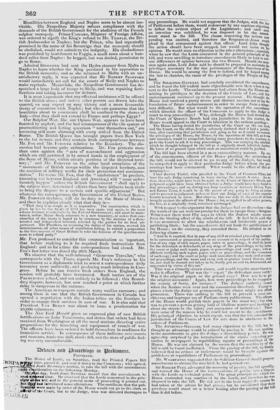Hostilities between England and Naples seem to be almost ine-
vitable. his Neapolitan Majesty refuses compliance with the demands of the British Government for the abolition of the French sulphur monopoly. Prince CASSARO, Minister of' Foreign Affair?, was ordered to signify the King's refusal to Mr. TEMPLE, the Bri- tish Ambassador at Naples; but the Prince, who had repeatedly promised in the name of his Sovereign that the monopoly should be abolished, would not submit to the indignity. His disobedience was punished by banishment to Faggia, a small town about a. bun- dred miles from Naples: he begged, but was denied, permission to go to Rome.
Admiral STOPFORD had sent the Hydra steamer from Malta to Naples to learn whether the King persisted in his opposition to the British demands; and as she returned to Malta with an un- satisfactory reply, it was expected that Sir ROBERT STOPPORD would immediately set sail for the coasts of Sicily and Naples to make reprisals. Meanwhile, the Neapolitan Government has de- spatched a large body of troops to Sicily, and was repairing forti- fications and taking IneaStIreS for derence. It is most improbable that any effectual resistance will be offered to the British arms; and unless other powers are drawn into the quarrel, we may expect an easy victory and a more favourable treaty of commerce with Naples ; but who can guarantee that the hostilities about to commence shall be confined to the shores of Italy—that they shall not extend to France and perhaps Egypt ?
Our Sulphur War, like our Opium War, appears to have been fostered by neglect; and the bad consequences of the vile system of procrastinating and ktting questions " wear themselves out," are becoming still more alarming with every arrival front the United States. The British Queen has brought papers from New York to the 1st instant, and they contain fresh correspondence between Mr. Fox and Mr. Foasyrn relative to the Boundary. The dis- cussion had become quite acrimonious. Mr. Fox protests more than once against the " acts of encroachment and ;Aggression which are still persisted in by armed bands in the employment of the State of Maine, within certain portions of' the disputed terri- tory ;" and .Mr. FORSYTH On the other hand complains of the " movements of British troops within the disputed territory, and the erection of military works for their protection and accommo- dation." lie warns Mr. Fox, that the " misfortunes" he predicts, (uncaring war between England and America,) will " most unfor- tunately happen " unless tile British Government " shall apply to the subject more determined etibrts than have hitherto been made to bring the dispute to a certain and specific adjustment." But whatever the consequences, the Government of the United States, Mr. FORSYTH declares, will do its duty to the State of Maine ; and then he explains clearly what that duty is— "That duty is as simple eee it is imperative. The construction which is given by her to the treaty if 173 has been again and again, in the most solemn mr-nner, asserted olio 1%.■ the Federal Government ; and must be main- tabled, unless Maine freely consents to a new boundary, or unless that con- struction of the treaty is found to be erroneous by the decision or a disin- terested and independent tribunal, selected by the parties for its final ad- justment. The President, on assuming the duties of his station, avowed his determination, all other 111CallS of negotiation failing, to submit a proposition to the Goverument of Great Britain to refer the decision of the question once more to a third party."
Mr. Fox professed to consider this communication so important, that before replying to it he required fresh instructions from England: and so for a time the correspondence bad closed. Mr. Fox's last letter was dated the 26th March.
We observe that the well-informed " Genevese Traveller," who corresponds with the Times, regards Mr. Fox's reference to his
Government as a diplomatic trick to arrest a correspondence daily becoming more unfriendly, and producing much irritation in Con-
gress. Before he can receive fresh orders from England, the session will probably have terminated. Such tactics are of the PAemlats-roN Kthool, and not unlikely to be followed : this Bound- dary dispute, however, has now reached a point at which further delay is dangerous in the extreme.
The American newspapers contain many warlike rumours ; and among them is one that the British Government in Canada has opened a negotiation with the Indian tribes on the frontiers in order to engage their services in case of war. It is also said that President VAN Beaux was about to issue a proclamation for 25,000 volunteers.
The New York Herald gives an engraved plan of new British fortifications oil Lake Teiniscouta, and states that orders had been received from Washington at all the naval stations directing active preparations fbr the launching and equipment of vessels of war. The officers have been ordered to hold themselves in readiness for immediate service. In consequence of these bellicose movements and rumours, trade was dull, stocks fell, and the state of public feel- ing was very uncomfbrtable.


























 Previous page
Previous page